Supplement Your Skin: A Holistic Guide To Common Skin Treatments
Many people struggle with the fight for youth when it comes to their skin. Starting in teenage years for most, they find dry or oily skin cumbersome. Then comes acne, oily skin, dry and patchy skin, and then wrinkling that comes with age. For this reason there are millions spent on anti-aging creams and lotions, to be applied to the skin.
There is certainly something to be said for these kinds of topical options. Particularly in our society in which being beautiful equates to success. However, there are also a number of things that you can do such for your skin that doesn’t involve spending thousands on chemicals.
Taking care of your skin and adding skin supplements to your daily routine can make all of the difference when it comes to keeping your skin supple and smooth.
Skin Conditions
Skin conditions come in many forms. Working towards correcting problems can be tricky if you do not know the root of the cause to your skin impurities. Understanding what is at the core of your skin trouble is the first step to providing the best care.
And this is the good news!
While changes in the skin over time due to age or environmental issues can be frustrating, there are options for you. No matter what your age, your face can have that beautiful glow of youth and look brilliant throughout the years.
The way to do this is by focusing on taking care of the skin from the top to bottom, from the inside out. Working with holistic options, natural care and skin supplements designed to protect and maintain healthy skin, you’ll find it is easier than ever to get the results that you want.
To find out how to keep your skin looking it’s best, let’s start and see more about specific skin conditions.
 How To Deal With Common Skin Conditions
How To Deal With Common Skin Conditions
Your skin is your chance to give a first impression to the world. Before you open your mouth or hand in your resume or answer that wink, the person/persons on the other end have had to look at you. The maintenance of youth is a constant in the world of research and development. We will never stop looking for the fountain of youth.
For many people fighting off wrinkles, age spots and the other markers of age are not on the priority list at all. For many people irritating, unsightly sometimes incurable skin issues are at the top of their list.
Chronic Skin Conditions
Chronic Skin Conditions, by name and definition are not curable, however, they are treatable and certainly manageable. Simple changes in diet, lifestyle and incorporating supplements can make all the difference in getting across your best first impression. Some of the more common Skin Conditions suffered chronically by a large number of people are:
Acne: While mostly suffered by those of us during our adolescence, more than 20% of the incidents still occur in adults.
Eczema: Hundreds of thousands a year are affected by this socially and physically debilitating condition. The skin becomes highly irritated, dry, and cracked. The cracked skin can then become infected by the simple bacterias that live on the skin.
Psoriasis: Commonly recognized due to the instances of silvery scales and also thick, red marks all over the skin is rampant with Psoriasis.
Rosacea: The condition known as Rosacea is not just an ailment like acne is, iIt is actually a grouping of skin conditions that cause both irritation and inflammation and can also affect more than just the skin.
Acne
 Acne is a generic term for a very general and common skin condition. Often referred to as “common” acne, because everyone at one time or another has hd a breakout of acne, even if it is just a few pimples here and there over the years. It is also common because almost anything can cause pimples to manifest, even something as some dirt getting into an open pore can cause them. The size of the open pore in conjunction with your genes and hormones will determine the level of infection and thereby the type of the acne.
Acne is a generic term for a very general and common skin condition. Often referred to as “common” acne, because everyone at one time or another has hd a breakout of acne, even if it is just a few pimples here and there over the years. It is also common because almost anything can cause pimples to manifest, even something as some dirt getting into an open pore can cause them. The size of the open pore in conjunction with your genes and hormones will determine the level of infection and thereby the type of the acne.
The Typical Symptomatology of Acne
- Papules – Small raised bumps created by infected hair follicles
- Pustules – Red raised bumps with pus filled tips
- Nodules – Painful, solid lumps beneath the skin surface
- Cysts – Puss filled, painful infections found beneath the skin surface
What Is The Cause Of Acne
The copious amounts of research done in this field have revealed that while teens and faces are the common targets of acne, adults and other parts of the body are not immune. It has also shown that no amount of face washing or swearing off of chocolate will stop this nasty skin condition from knocking on your door. Our bodies naturally create the bacteria that clogs the pores that cause acne to form. The hormones in our bodies directly affect the reaction our bodies have to the clogged pore.
No Easy Fix
Unfortunately there is no easy fix for acne. There are several hundred products on the market all claiming to be the smoking gun fix for this age old skin condition, however, there is no cure for acne. For mild cases of acne there are several over-the-counter supplements available to assist in the body’s reaction to the bacterias, assisting in keeping the mild breakouts at bay.
The Medical Fix For Acne
For many acne is extremely painful both mentally and physically and can be addressed by a physician in many ways. They may advise you to take certain skin supplements such as tea tree oil or Vitamin E or prescribe one of the following:
- Topical Antibiotics
- Topical Retinoids
- Azelaic acid
- Dapsone
 Eczema
Eczema
There is no specific test that can be given to determine if you are suffering from Eczema, but a doctor is likely to take one look at you and your symptom and be able to diagnose it. Doctors will focus on issues related to allergies based on the rashes they see and will also ask questions about your history and whether or not you have ever had hay fever or allergies.
The Typical Symptomatology Of Eczema
The one thing that can be counted on with this skin condition is that it is consistent in its appearance. When looking for signs of eczema you can expect to see:
- Itchy Skin
- Dry Skin
- Rough Skin
- Flakey Skin
- Inflamed Skin
- Irritated Skin
- Brownish/Grey or Red Patches
- Small Bumps
- Oozes blister like fluid when scratched
What Is The Treatment For Eczema?
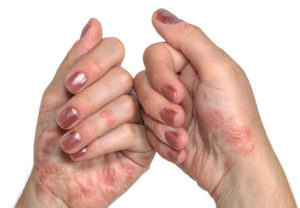 Proper skin care is paramount when it comes to dealing with Eczema. In fact, in some cases of eczema, maintaining proper skin care and a few lifestyle changes may be all it takes to deal with the problem. Unfortunately, though in most cases medications, therapies and dietary supplements are required to deal with the symptoms of this skin condition.
Proper skin care is paramount when it comes to dealing with Eczema. In fact, in some cases of eczema, maintaining proper skin care and a few lifestyle changes may be all it takes to deal with the problem. Unfortunately, though in most cases medications, therapies and dietary supplements are required to deal with the symptoms of this skin condition.
The Easy Fix For Eczema
For those suffering with mild cases of Eczema, simple things like using the proper mild soaps and moisturising properly after bathing and then again later in the day can make all the difference in symptoms. The dryness of the skin creates the rash like affected areas that are extremely itchy and inflamed and in some cases bumpy and can then become infected so keeping a gentle lotion on hand or some hydrocortisone can truly help as does:
- Use mild soaps
- Short warm showers
- Reduce stress
- Get a humidifier (it will add a little moisture to the air for your skin)
- Over the counter (OTC) skin supplements
The Medical Fix For Eczema
For many suffering this extremely painful skin condition, doctor prescribed medications and added dietary supplementation is the only way to deal with the symptoms.
Medications and other therapies available for the treatment of eczema are:
- Antihistamines
- Ultraviolet Light Therapy
- Immunomodulators
- Immunosuppressants
- Hydrocortisone
- Corticosteroids
- Prescription Strength Moisturizers
 Psoriasis
Psoriasis
Experts cannot be sure of the exact cause of the skin condition known as Psoriasis. It is believed that something misfiring within the immune system kick starts the inflammation process, which in turn causes a new generation of skin cells to be born. Skin cells on average replace themselves on an almost monthly cycle occurring every 27 to 30 days.
In people with Psoriasis, skin cells are replaced every three to four days creating a build up of skin cells on the surface of the skin which then creates the silvery scales common to this disorder.
Things That Can Trigger A Breakout
- Scrapes and cuts
- Surgery
- Emotional stress
- Strep infection
Typical Symptomology For Psoriasis
- Plaque – Thick red patches of skin
- Guttate – Small red spots that can be found not only on the face but on the torso, scalp and limbs
- Inverse – A shiny, smooth red rash that presents in the folds of the skin
- Pustular – White pustules circles with red skin
- Erythrodermic – Mirrors third degree type burns and covers very large portions of the skin
What Is The Treatment For Psoriasis?
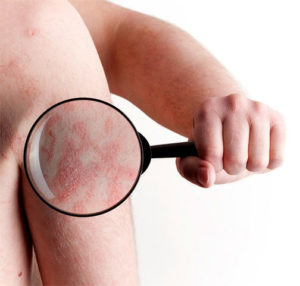 The “good” thing about Psoriasis is that there are plenty of treatments and therapies available both over the counter and through the prescription of your doctor. Many will address the rate at which new skin cells are created and others will address the itchy dry skin issue.
The “good” thing about Psoriasis is that there are plenty of treatments and therapies available both over the counter and through the prescription of your doctor. Many will address the rate at which new skin cells are created and others will address the itchy dry skin issue.
Your doctor will assist in the proper treatment plan based on the size and location of the rash. Things like your age and overall health will also need to be considered when deciding the proper treatment plan for you.
The Easy Fix For Psoriasis
In dealing with mild cases of Psoriasis there are several over the counter methods to deal with skin cell generation as well the itchy dry skin associated with this skin condition. Some of those methods include:
- Moisturizers for Dry Skin
- Steroid Creams
- Retinoid Creams
- Over-the-Counter Supplements
The Medical Fix For Psoriasis
When dealing with more serious cases of psoriasis, a doctor may prescribe one or more of the following:
- Light Therapy
- Methotrexate
- Retinoids
- Cyclosporine
- Biologic Treatments
 Rosacea
Rosacea
Rosacea is a very common skin condition that primarily affects the skin on the face. However, for many, this skin condition is not just limited to the skin and when it is it likely to manifest in different types. One person can be affected by several subtypes of the condition all at once. Each person dealing with Rosacea has a different experience.
Typical Symptomatology Of Rosacea
- Flushing
- Persistent Redness
- Bumps and Pimples
- Visible Blood Vessels
- Eye Irritation
- Burning or Stinging on the face
- Dry appearance
- Plaques – Red Patches
- Skin Thickening
- Swelling
What Is The Treatment For Rosacea?
 A person's treatment of rosacea is a directly related to their symptomatology and can be limited:
A person's treatment of rosacea is a directly related to their symptomatology and can be limited:
- Medications may be prescribed to deal with bumps and redness in an attempt to attain remission of the skin condition
- Surgical remedies may be called for when excess tissue and swelling is involved specifically with regard to the nose and ears
- Over-the-counter supplements to deal with individual symptoms
What Can I Do To Prevent Rosacea?
When dealing with the skin condition Rosacea, there are treatments to deal with the individual symptoms and preventative measures that can be taken in an attempt to achieve relief. Some of the preventative measures that can be taken by a person suffering from the effects of Rosacea specifically deal with lifestyle and environmental factors.
When dealing with rosacea a person wants to avoid or limit the following:
- Sun/Wind Exposure
- Emotional Stress
- Extreme Hot/Cold Weather
- Heavy Exercise
- Alcohol Consumption – Specifically Red Wine
- Hot Beverages and Food
- Spicy Foods
 Not-So-Chronic Skin Conditions
Not-So-Chronic Skin Conditions
Cutaneous Candidiasis
- Usually occurs in skin folds (armpits between fingers)
- Can be white or Red
- Can progress to cracked sore skin with blisters and pustules
Keloid
- Symptoms occur at the site of a previous injury
- Bumpy or ridged area of skin
- Area that flesh colored, pink or red or purple
Hives
- Itchy raised welts
- Red and painful to the touch
- Can be small and round in shape or large and randomly shaped
Shingles
- Itchy Red Patchy with Fluid filled blisters that break easily
- Rash that wraps around the spine and torso
- May be accompanied by Fever, Chills, Headache or Fatigue
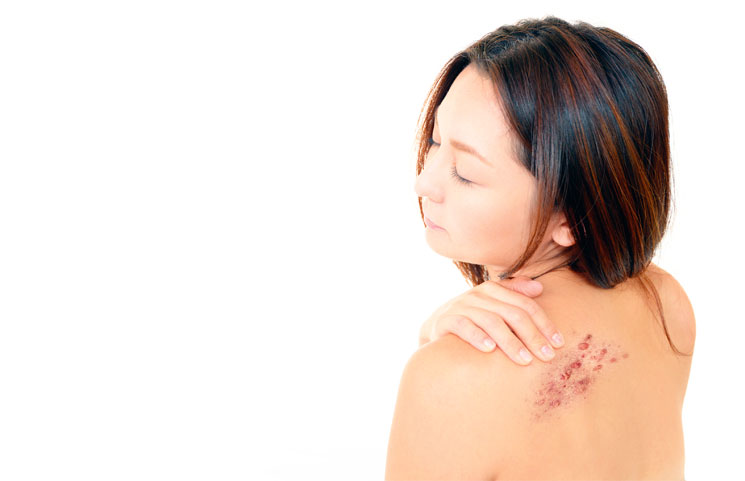 What Can I Do At Home To Treat These Chronic Skin Conditions?
What Can I Do At Home To Treat These Chronic Skin Conditions?
While there is no “cure” for any of these chronic skin conditions, there are several prescription medications and therapies available as well as a multitude of over-the-counter skin supplements that can play a crucial role in better dealing with the symptoms of these particular chronic skin conditions.
Acne
There are well over 50 different supplements that can be used to assist with the treatment of this irritating skin condition. The ones that appear to show the most promising effects are listed below:
Zinc
Zinc is a mineral that has been proven crucial to the body and its systems. Specifically, zinc is key to the to division and growth of new cells in the body. It has also been shown in research that most people suffering from acne are also suffering from zinc deficiency. If your current diet consists mostly of vegetables, grains and beans then you are more than likely zinc deficient.
How does Zinc Work?
For some “lucky” acne sufferers, the simple addition of a zinc supplement can literally be a game changer. These are the people who are specifically suffering from acne due to a zinc deficiency in their bodies. For the rest of the acne suffering world zinc will be one of several supplements taken to assist with the ongoing problem. Zinc is not only crucial to the development of new cells but it also plays a key role in the reduction of the body inflammatory response to the bacteria responsible for acne.
 Bovine Cartilage
Bovine Cartilage
The substance cartilage is already found in the body and provides it with structural support. Cows provide the bovine cartilage that can be beneficial to the human body as a supplement that supports immune and neural functions. Bovine cartilage is used to treat a host of serious illnesses including cancer. It is specifically taken either orally or subcutaneously (injected beneath the skin) to treat these illnesses.
How does Bovine Cartilage Work?
With regard to acne, bovine cartilage can be applied directly to the skin to ease inflammation and breakouts. When taken orally, this can have beneficial effects on the skin as a supplement to support healthy growth of new skin and reduce the amount of acne eruptions.
Probiotics
While it may seem strange to see a Probiotic listed as a supplement to take to help acne, given the standard prescription of antibiotics when dealing with acne, there is a really good reason. It may also seem strange given that usually when we think of probiotics we think of digestive health not our skin.
How do Probiotics Work?
Research has shown that your gut needs plenty of good bacteria in order to function properly. When the gut is not functioning properly, it can and will create chaos with your entire body and will cause inflammation, even on your skin. The skin inflammation involved in acne is one of the primary symptoms that need to be addressed. Balancing out your gut will also allow your body to better use the nutrients from food which might also help your body calm down the acne.
 Krill Oil
Krill Oil
Krill oil comes from a specific species of Krill from the antarctic called, Euphausia Superba. There are two specific factors of this extract that one is looking for in a supplement. The first being omega-3 fatty acids like those you find in fish oil, the second being the antioxidant astaxanthin.
How does Krill Oil Work?
The two components of Krill Oil Extract, omega-3 fatty acids and the antioxidant astaxanthin are both key elements to skin health. It has been shown that the omega-3 fatty acids assist in production of healthy cell membranes. As well as assist in the reduction of swelling or inflammatory response in the deeper skin layers. The antioxidant astaxanthin assists with the protection of the skin from environmental attackers like the sun as well as fighting free radicals.
Evening Primrose Oil
The oil that is used in supplements and soap making is derived from the seed of the Evening Primrose plant. Evening primrose oil is another in the many fatty acids needed to assist our bodies function properly.
How does Evening Primrose Oil Work?
Evening primrose oil has been used for centuries specifically for the treatment of skin conditions. In Britain it was actually approved for a short time as an effective medical treatment for acne but no longer holds that approval. Not only does evening primrose assist with inflammation but it also assists the body to deal with pain.
 Olive Oil
Olive Oil
This oil is pressed from olives and has been used for centuries for medicinal purposes as well as to make soaps and for its use in cooking. For acne, the main benefits come when it is used topically.
How Does Olive Oil Work?
Olive oil is an ancient skin cleanser and has been used specifically to deal with the skin inflammation associated with acne. The oil can be applied directly to the skin to act as a cleanser to remove the dirt and bacterias that cause acne breakouts.
Vitamin A
Vitamin A is commonly known as retinol, which is probably familiar to you if you purchase skin or beauty products. It is beneficial to immune system and aids with cell growth which is essential for glowing healthy skin.
How does Vitamin A Work?
Vitamin A plays a crucial role in dealing with acne because it has a direct effect on the desquamation of dead skin cells. Dead skin cells combined with the natural bacterias and the body’s reaction to them is the cause of most acne, which can be alleviated with appropriate levels of Vitamin A within the body.
Serums are also a common way to use this vitamin as a skin supplement. Usually mixed with Vitamin E, it can increase healing time for infectious acne, carbuncles, facial cysts and ingrown hairs that are associated with acne.
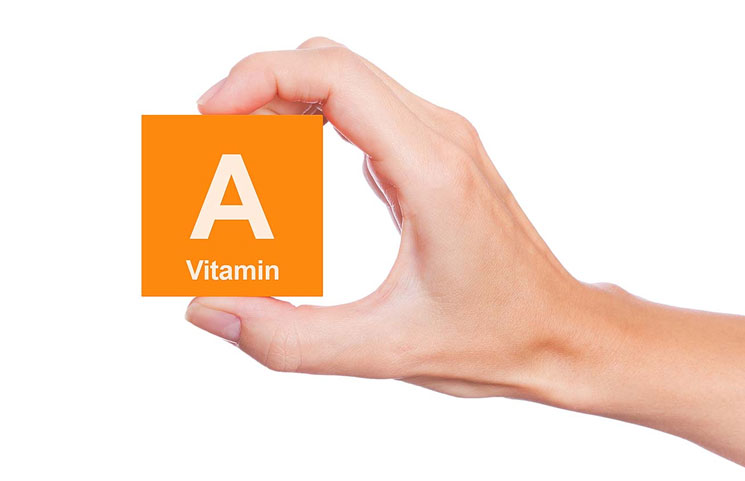 Vitamin B Complex
Vitamin B Complex
Vitamin B Complex is a grouping of 8 nutrients, B1, B2, B3, B5, B6, B7, B9 and B12. Each of these nutrients can be taken separately for different effect on the body but when dealing with the skin the complex is most beneficial. Taking a complex supplement, Vitamin B aids with overall health and immunity and specifically assist in the health of the skin, hair, liver and eyes.
How does Vitamin B Complex Work?
Vitamin B Complex can assist with your immune system’s reaction and the resulting inflammation. Lowering your stress levels will also decrease your acne breakout. Additionally, the vitamins work together to both calm epidermal layers by decreasing agitation and can also induce regeneration of new cells, which helps you heal more quickly from an acne outbreak.
Too much B6 and B12 can both cause outbreaks of acne if you take too much. For this reason it is important to monitor the amount you take and to calculate B vitamins that you get from food, multivitamin and skin supplement sources.
Selenium
Selenium is an antioxidant as well as a dietary mineral that is essential to the body and its overall general health. This Dietary mineral can be found in animals foods like meats, fish and eggs.
How does Selenium Work?
Selenium is an excellent choice for a skin supplement for acne because it combats many common epidural bacteria types and also reduces inflammation. This can reduce the symptoms of acne while cutting down the time that outbreaks last for. Additionally, many people suffering from acne have been shown to be selenium deficient.
Keep in mind, taking Selenium will not prevent acne from occurring, it is one of the best supplements to reach for when an outbreak occurs.
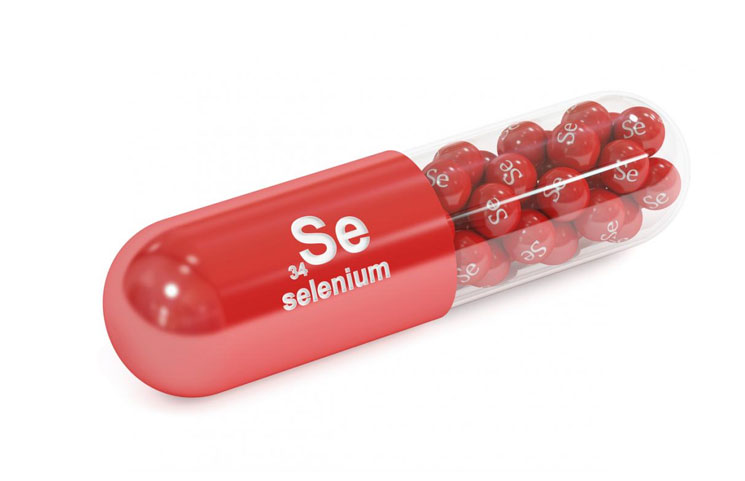 Magnesium
Magnesium
Magnesium is an essential mineral that affects a multitude of body functions including the body’s reaction to bacterias, hormone levels and cell growth.
How does Magnesium Work?
Magnesium will work to assist your body in its reaction to the bacterias that cause acne as well as the resulting inflammation. It also has a direct effect on the hormone levels and provides assistance in that constant balancing act which in turn has a direct effect on acne and the body’s reaction to it.
Calcium
Calcium is required for the body’s natural production of antioxidants as well as assisting with cell renewal.
How does Calcium Work?
Calcium works to assist the body produce antioxidants which helps to fight inflammation. Calcium supplements taken in combination with Magnesium have been proven to assist in dealing with the inflammation associated with acne.
 Turmeric
Turmeric
This spice has been around for centuries and is mostly known for its use in Indian Cuisine. It has been a fundamental part of “Ayurvedic Medicine” a centuries old medicinal practice in India This spice’s amazing medical principles have only recently been recognized by those in the United States.
How does Turmeric Work?
Research has shown Turmeric to be unequaled in dealing with inflammatory issues of the body as it is exceedingly rich in anti-inflammatory essentials. For this reason alone its use with regard to acne is clear. Turmeric is also high in the antioxidant curumin which has also been utilized when dealing with acne.
Fish Oil
Known for its high content of omega-3 fatty acids, Fish Oil is fundamental supplement when dealing with all health issues.
How does Fish Oil Work?
Studies have shown that the omega-3 fatty acids assist in production of healthy cell membranes. As well as assist in the reduction of swelling or inflammatory response in the deeper skin layers. So its use with regard to acne is clear.
 Vitamin D
Vitamin D
Vitamin D has been proven to be a fundamental component to the endocrine system of a healthy body. While the most basic way for your body to attain Vitamin D is through exposure to the sun, over 75% of Americans are Vitamin D deficient.
How does Vitamin D Work?
The endocrine system is just another way of saying the body’s system of hormones. Vitamin D being essential to a healthy hormonal balance would assist with acne by assisting in the control of the hormonal response to the bacterias.
Eczema
There are more than 31 different supplements that can be used to assist with the treatment of this irritating skin condition. The ones that appear to show the most promising effects are listed below:
Licorice
The root of the licorice plant has been used for centuries as a medicinal tool to prevent inflammation. Since Eczema is an inflammatory condition, Licorice helps calm down raised skin.
How does Licorice Work?
Licorice has been used for centuries as a medicinal tool to fight infections caused by bacterias and viruses.
 Rice Bran
Rice Bran
The oil made from rice bran has been used for centuries in Asia, Japan and India for medicinal purposes. Rice is actually a plant, not a seed as some might think and the oil as well as sheath of the grain are utilized medicinally.
How does Rice Bran Work?
Rice bran oil is used to treat eczema by placing directly onto the affected skin. It assists with the itching and inflammation. It also acts as a protectant against environmental assailants.
Galacto-oligosaccharides
This big and scary looking name is another word for plant sugars. Galacto-oligosaccharides are derived from beans, dairy products and specific root vegetables. These sugars are then utilized to make pharmacological and holistic treatments.
How does Galacto-oligosaccharides Work?
Galacto-oligosaccharides are used specifically to address and calm the itching associated with eczema.
 Selenium
Selenium
Since Eczema is an inflammatory condition, Selenium is essential for improving the overall health of the skin because of it’s antioxidant properties. Selenium is known to be found in various proteins, such as fish, or eggs but it is recommended to take it as an additional skin supplement if you have carbuncles or infected follicle types of acne.
How does Selenium Work?
Selenium can reduce inflammation, which is the main reaction that the body has to irritation and itching. Antioxidants are also known to have regenerative effects. Itching damages the skin. Each time you drag your nails across the skin, it breaks down the cells. Taking selenium can increase healing speed of Eczema while preventing the skin from drying out. This can reduce specific outbreaks of Eczema.
Zinc
Zinc is responsible for dividing as well as regenerating new cells. When it comes to Eczema, the skin is reproducing unhealthy cells which are dying and sloughing off too easily. Zinc helps to control that.
How does Zinc Work?
Since Eczema is basically an inflammatory skin response, Zinc is an excellent choice of supplement to assist in the treatment of this skin condition because it calms down the swelling and enables the old skin cells to be reborn in a more healthy manner.
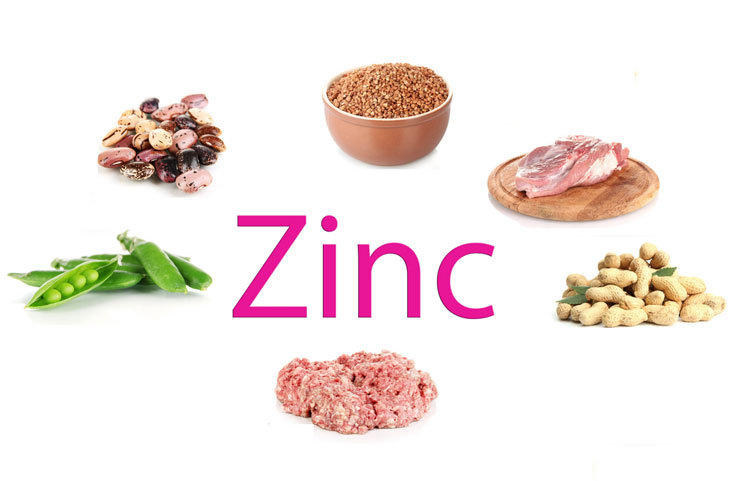 Evening Primrose Oil
Evening Primrose Oil
Evening Primrose oil has been used for generations as a beautiful smelling oil, often used to cause relaxation in aromatherapy. When using the oil as a supplement for Eczema it also has a relaxing effect as it refreshes dry and cracked skin.
How does Evening Primrose Oil Work?
Skin that is affected by Eczema can get large irritated patches that are often exacerbated by stress and hormone fluxes. For this reason Primrose can be quite helpful. It helps to regulate hormonal inconsistencies which then decreases the inflammation of the rash itself and allows space for the cells to create new and better skin.
Psoriasis
There are more than 29 different supplements that can be used to assist with the treatment of this irritating skin condition. The ones that appear to show the most promising effects are listed below:
Aloe
Aloe, more commonly known as Aloe Vera is a plant which provides a gel that we use medicinally. The gel comes from inside the leaf of the aloe plant and has been most widely used to treat sun burns.
How does Aloe Work?
It can be applied directly to the skin and can even be found with lidocaine which will assist not only with soothing the skin but will numb the pain and itching for a time. Aloe may also be ingested and will assist with the treatment of body inflammation, including the skin, as well as itching.
 Bovine Cartilage
Bovine Cartilage
A less common but highly effective skin supplement, Bovine Cartilage is extracted from cows and is helps increase blood flow to the skin cells and makes them stronger.
How does Bovine Cartilage Work?
When it comes to Psoriasis, Bovine Cartilage taken as a supplement, will actually work to heal the flaky flesh caused by the disorder from the inside out.
Evening Primrose Oil
Psoriasis can cause painful dry and cracked skin that appears in thick flaky patches. Not only is it uncomfortable, depending on where you have the condition on your body, it can also be embarrassing. Using primrose oil on the affected areas brings moisture up and takes the dryness away which provides a healthy environment for the flesh to heal.
How does Evening Primrose Oil Work?
Primrose oil breaks apart dead skin and rebuilds the structure of the cell walls, new skin can be grown. Using it as a supplement for the skin, it can reduce the amount of scaly skin that is present with the condition and can even break down the upper layers, reducing the effects over time. Dermatologists often recommend this supplement for psoriasis specifically because it works wonders to reduce early and mild cases of the condition. The sooner you take it, the more beneficial it can be.
 Fish Oil
Fish Oil
Heavy with omega-3 fatty acids, fish oil has been used for many years to create a certain plumpness in facial features. When afflicted by Psoriasis, increasing blood flow to the area makes a big difference.
How does Fish Oil Work?
Membranes of skin cells are broken down when you have Psoriasis which is what causes the cracked, flaky and silver skin. Using Fish oil as a topical or oral supplement takes the swelling down and cleanses on a deeper level.
Isatis
This yellow, flowering plant grows in both northern and central China. Both the roots and leaves of this plant are utilized to make medicine and the Chinese have been using it medicinally for centuries. This plant has been used to treat some very serious illnesses including cancer and other body infections.
How does Isatis Work?
With regard to psoriasis, isatis can be found in a salve or cream form and be applied directly to the skin. It can also be found as a tincture, tea or capsule and taken orally for this skin condition.
 Selenium
Selenium
Selenium helps to keep the skin clean of excess dangerous bacteria. It can be found in multivitamins, but because of its antioxidant properties and contributions to overall body healing, it can be quite helpful as a supplement for skin disorders such as Psoriasis. When taken orally, it increases the overall immune system of the body which helps calm the symptoms of Psoriasis down.
How does Selenium Work?
Studies have shown that selenium is a key ingredient to the body fighting off inflammatory skin issues. Many people suffering from psoriasis at a chronic level (which is those that have had symptoms of the condition for more than three years consecutively) have been shown to be selenium deficient as well. This shows that there is a direct link between selenium and how the body reacts to psoriasis. Selenium does not cause a reduction in the severity of the symptoms of psoriasis but can quell and early outbreak in some cases. The main reason to take it as a supplement for psoriasis is because of the deficiency risk, which can cause additional body malfunctions.
Oregon Grape
The root of this plant, as well as its root like stem or rhizome, can be utilized to make medicine and is considered an excellent skin supplement for psoriasis. Taken orally, it is usually used for gastric and digestive issues, both of which systematic issues can aggravate psoriasis.
How does Oregon Grape Work?
Similar to the effects you might find in Probiotics, the Oregon grape aids in calming down the intestinal tract so that nutrients from food sources can be properly broken down so that the enriched vitamins can heal the skin.
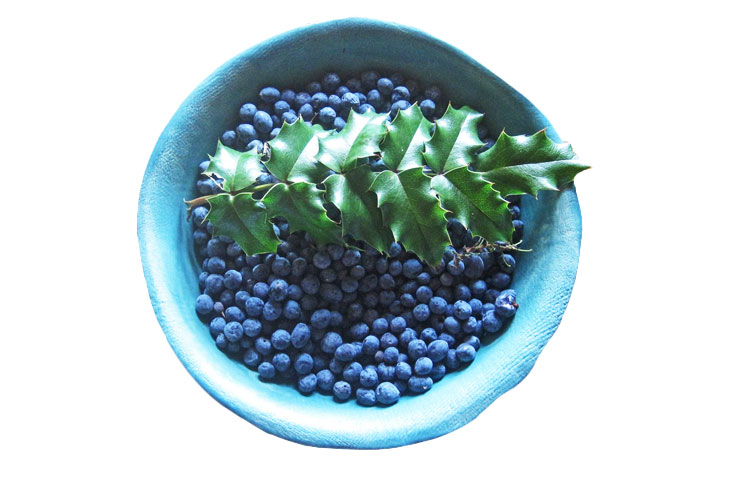 Vitamin B12
Vitamin B12
Vitamin B12 is essential to your body one often if when there is a deficiency within the body, it is accompanied with anemia which can contribute to skin conditions. However, when dealing with psoriasis Vitamin B12 is specifically beneficial. You can get this vitamin in liquid, pill or shot form. It is also commonly in energy drinks and is part of the B complex vitamins compound.
How does Vitamin B12 Work?
Vitamin B12 not only assists with the body’s inflammatory response but also with cell growth. Taken as a supplement for psoriasis, vitamin B12 can assist reducing the amount of epidermal plaque that is a tell tale sign of the condition. When directly to the skin (usually combined with avocado oil) it can help outer layers of plaque to be easily removed. In early stages of the condition, new patches of psoriasis can be prevented by vigilant use of Vitamin B12.
On the other hand, too much B12 can cause other skin conditions – including agitating acne. Talk to your healthcare provider about the appropriate amount of B12. They may suggest you take weekly or monthly shots of the vitamin to manage psoriasis and inflammation symptoms.
Vitamin D
Most people get their Vitamin D through the sun or milk, but it has been noted that deficiency of the vitamin is often found in conjunction with psoriasis. For this reason it is a recommended skin supplement for people with the condition specifically.
How does Vitamin D Work?
Vitamin D is largely made within the body when it reacts with sunlight, sort of in a similar fashion to how plants utilize the sun to process energy. In the human body, this process will create Vitamin D, which has effects on the immune and endocrine system.
The endocrine system is the part of the body that controls hormonal systems. Vitamin D aids in hormonal regulation, supplementing the process and making it more efficient. Plus for immune support, Vitamin D aids in the body’s regeneration process. Since psoriasis symptoms can be aggravated by an overactive or underactive immune system and hormonal imbalances can also influence the tenacity of psoriasis, maintaining balanced levels is important.
 Rosacea
Rosacea
There are more than 20 different supplements that can be used to assist with the treatment of this irritating skin condition. The ones that appear to show the most promising effects are listed below:
Flaxseed
Flaxseed also known as linseed is a fiber crop that is grown in cooler regions. These dietary fibers and micronutrients have been used for centuries as medicine in both China and India.
How does Flaxseed Work?
Daily use of Flaxseed can assist in the control and reversal of the inflammation and redness associated with Rosacea. For a stronger remedy you can mix the flaxseed with grape seed oil the combination has been proved a great relief for those suffering from rosacea.
 Fish Oil
Fish Oil
Fish oil does come from fish, but if you don’t like the taste of seafood you’ll be happy to know that it is available also in encapsulated fluid pills, so you get all of the benefits without the flavor.
How does Fish Oil Work?
Known for its high content of omega-3 fatty acids, Fish Oil is fundamental natural supplement when dealing with all health issues. It provides elasticity to the skin and can reduce swelling or inflammation.
With regard to Rosacea, Fish Oil is beneficial in that it can be taken to assist with dry itchy eyes and can reduce the agitation to the tissue around the eyes. Some research suggests that it helps to moisten the skin of the cheeks and other areas that are inflamed due to the condition. It is theorized that this can reduce red patches on the face.
Olive Oil
This oil is pressed from olives and has been used for centuries for medicinal purposes as well as to make soaps and for its use in cooking. Olive oil is an ancient skin cleanser and has been used specifically to deal with the skin inflammation caused by rosacea. The oil can be applied directly to the skin. Romans would use this to bathe themselves, which is why they are also known for having clear and glistening skin. It is also helpful when used as a supplement for dry and flaky skin, dermatitis and psoriasis.
How Does Olive Oil Work?
All oils coat epidermal cells, allowing moisture to be locked into the skin. Olive oil specifically has moisturizing properties as well but in addition, it is also mildly antibacterial. Using it topically, it will cause the skin to be more elastic and not flake. Additionally, it helps to heal broken capillaries of the face and can calm red patchy outbreaks associated with rosacea.
 Probiotics
Probiotics
Probiotics are essentially good bacteria for your gut. They help balance out bacterial levels, thus allowing your body to properly function all levels. This includes the skin.
How do Probiotics Work?
When the bacteria levels are balanced out in the system, it can quell additional stress based inflammation in all areas of the body. Rosacea is often caused by mild inflammation of the skin on the face. With probiotics, outbreaks of rosacea can be avoided especially if you find that your symptoms are often in response to your body being under stress. You will know if this is the case if your flare ups happen often after you are sick, injured or have taken antibiotics.
Apple Cider Vinegar
This vinegar is made from Apple Must and is an amber in color. It has been used medicinally for centuries for a number of ailments but is especially effective when used as a supplement for rosacea. It can be used internally as well as topically.
How Does Apple Cider Vinegar Work?
Apple Cider Vinegar is rich in antibacterial properties and also acts as an astringent due to its acidic nature. A common cause for an outbreak of rosacea is an imbalance of the natural oils in our skin, so when applied topically to the surface of the skin by soaking a cotton ball or soft cloth, apple cider vinegar can keep rosacea outbreaks from happening or remove the inflammation in an outbreak that is already occurring.
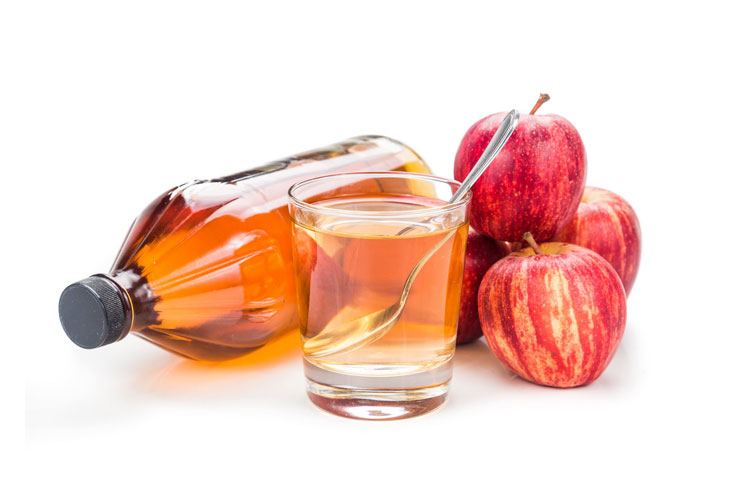 Selenium
Selenium
Selenium is easy enough to get from proteins like fish and dairy. Most multivitamins also include it in their ingredient lists. However, because it is so vital to fighting inflammation it is generally recommended to take additional amounts when rosacea supplements are recommended.
How does Selenium Work?
Studies have shown that selenium is a key ingredient to the body fighting off inflammatory skin issues. Many people suffering from rosacea have been shown to be selenium deficient, so there is a definite direct link between healthy levels of the mineral in the body. Additionally, it is vital to the healing process, which is needed in order to recover from rosacea outbreaks.
Turmeric
Often found in the spice section of the grocery store and commonly used in Indian Cuisine, this spice has long been used for it’s anti-inflammatory properties in other countries. Because it has a pungent spicy flavor and the powdered spice form of the herb can turn everything it touches a bright yellow color (including your clothes and countertops) it is often preferred to use this as a skin supplement in pill form.
How does Turmeric Work?
Turmeric reduces inflammation in the gut, and works in a fashion similar to probiotics. It is used internally only for rosacea and aids in the ability to reduce red patchy outbreaks. However, intense amounts of this herb can also cause dehydration which can dry out the skin. For this reason it is important to drink lots of water to make this skin supplement effective for rosacea treatment.
 Vitamin A
Vitamin A
Vitamin A can be found in most all skin care products. It is in a major component of skin care products because it is a compound known as retinol. When in the body Vitamin A is charged with the duties of supporting the immune system, cell growth, normal vision, production of red blood cells, and healthy skin.
How does Vitamin A Work?
Vitamin A plays a crucial role in dealing with the skin’s inflammatory response to rosacea because it has a direct effect on the cells of the skin. Many who use Vitamin A to treat their rosacea report a complete remission of symptoms.
Burdock Root
The scientific name for Burdock Root is Arctium it is an underground bulb that is used as both a vegetable and a medicine. It can help the body rid itself of toxins, which in turn usually means clear skin. Burdock root is taken orally for skin supplement uses.
How does Burdock Root Work?
Skin conditions like rosacea are most likely to flare up when your body is full of toxins. Burdock root is known to assist the body in detoxifying itself as well as assisting with the leveling out of hormone imbalances. For both of these reasons burdock root is an excellent supplement to turn to when dealing with this condition.
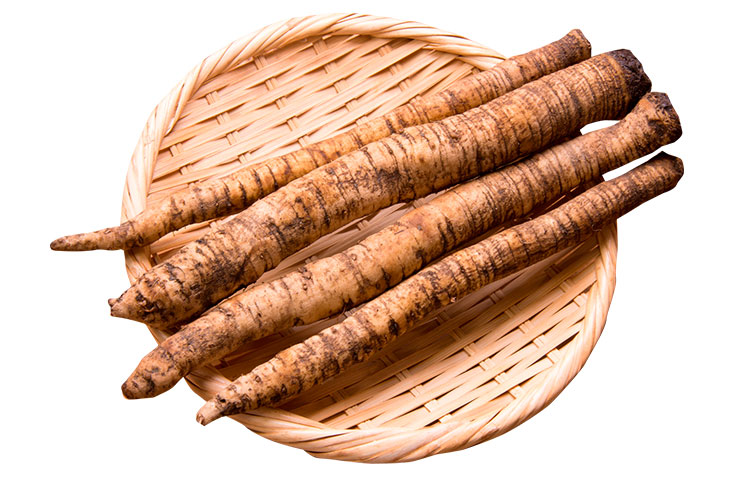 When to Talk to a Doctor
When to Talk to a Doctor
While we have specifically addressed the most common chronic skin conditions, the not so chronic skin conditions mentioned are all assisted by these same supplements. Skin Conditions like cutaneous candidiasis, keloid scarring, hives and shingles can all be aggravated by an unhealthy body and digestive system. Shingles, being a remnant of chickenpox however, should be addressed by your physician.
As should all of the skin conditions mentioned herein be sure that the skin supplements you are choosing for you are the right choice for your all over body health not just your outer layer.
As with all additions to your healthcare regimen, consult your doctor for proper dosages specific to your health issues and current prescription list to see which skin supplements are most helpful for you.
The Healthy Way to Deal with Your Skin Conditions
Arming yourself with information is one of the best things that you can do to care for your skin. As your skin ages, you may find that you need additional skin supplements for changes that occur. Be patient with your skin and care for it well by choosing complementary skin supplements, and you will see rewarding results.









